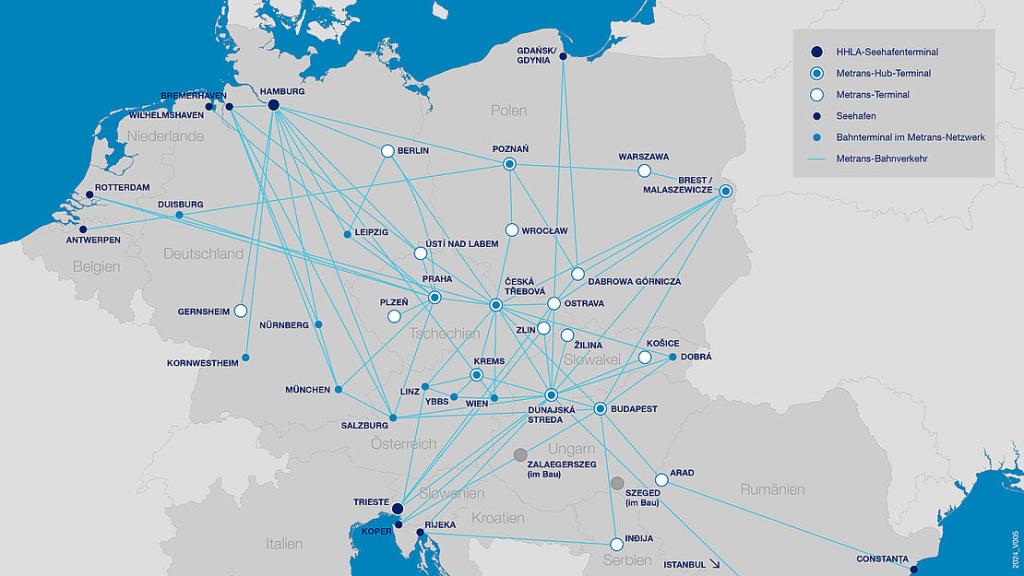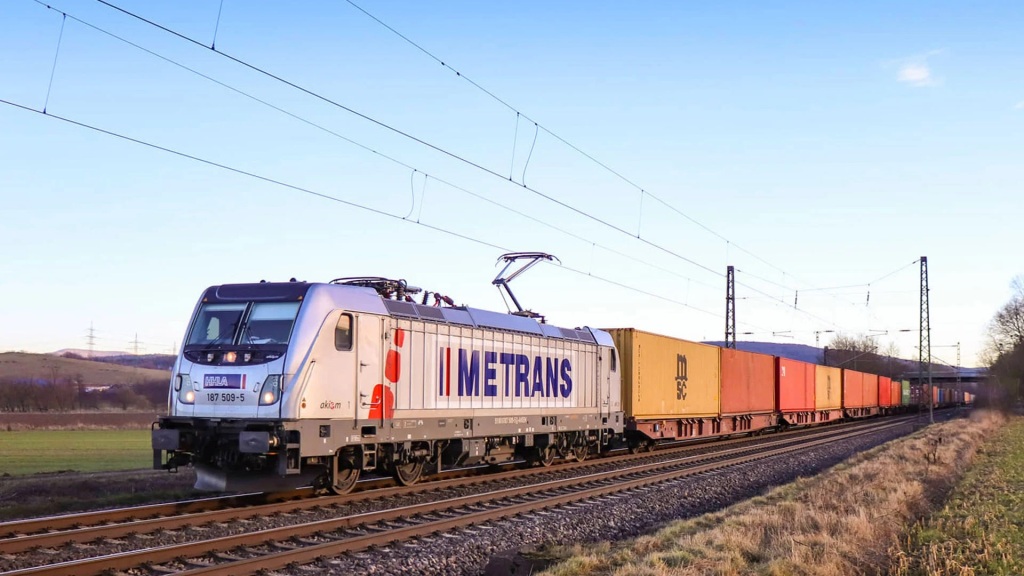Hamburg: securing the future with rail 26/02/24
< Back to listSource: https://mediarail.wordpress.com/2024/02/26/hambourg-garantir-lavenir-grace-au-ferroviaire/
Author: Frédéric de Kemmeter
Hamburg: securing the future with rail
The port of Hamburg is remote in Europe and the deepening of the Elbe is reaching certain limits. To avoid marginalization, a very distant fear despite everything, the port company has not only invested in a railway company but has as shareholder... a shipowner who himself has a railway freight subsidiary.
The limits of the Elbe
In order for large container ships to be able to access the port of Hamburg, enormous quantities of silt must be constantly extracted from the Elbe shipping channel. As there is too much silt in the Elbe, the Federal Directorate for Waterways and Shipping decided at the beginning of November 2022 to reduce the depth of navigable waters between Hamburg and the North Sea by one meter. According to the port authorities, in 2022 around 40 million cubic meters of silt will have been dredged from the access channel, raising ecological questions in the process.
In total, Hamburg must raise more than 100 million euros per year to dredge the silt from the Elbe. The recent deepening of the Elbe also cost around 800 million euros. These purely maritime aspects show the vulnerability of the large German port.

Rail side, no stringer
Despite its outlying location, the port of Hamburg, third in Europe in terms of container traffic, still carries nearly 8 million TEUs ( Twenty Equivalent Unit – Twenty Feet Equivalent ). Intermodal traffic is therefore intense and provides a welcome buoy. HHLA (Hamburger Hafen und Logistik AG), the city's port authority (in the north the ports belong to the cities, not the state), has a very aggressive rail policy.
Railtrans was originally a Czech railway operator established in 2003. The company moved to the name Metrans, its new shareholder, and by the early 2010s it became the dominant intermodal operator in the Czech Republic and neighboring Slovakia. It regularly operated its own open access trains to various major European ports, including Hamburg, Rotterdam and Koper, Slovenia.
Metrans operates almost 650 trains per week throughout Central Europe, from the Baltic to the Adriatic.
HHLA acquired Metrans of which it now holds 100% of the shares. It is quite rare for a port authority to have its own operator, without calling on the national public company (in this case DB Cargo). The operator connects Hamburg with its hinterland, particularly with the export-oriented economies of Central and South-Eastern Europe.

By operating 20 own terminals and a constantly increasing number of lines, the company optimizes both rail traffic and container handling. More than 130 TRAXX, Vectron and other locomotives and nearly 3,700 special wagons cover nearly 650 trains per week throughout Central Europe, from the Baltic to the Adriatic. Incidentally, this allows Hamburg to secure its flows and activities. Recently, the network was further expanded with the acquisition of the Adria Rail group, present in Serbia and Croatia.
An Italian shipowner in the shareholding of HHLA!
In October 2023, the “ Free and Hanseatic City of Hamburg (FHH)” (this is how Hamburg in Germany is defined), informed HHLA of an agreement with Mediterranean Shipping Company SA (MSC) on a strategic participation in HHLA in within the framework of an investor agreement. This agreement had been endorsed earlier by the SPD/Green coalition which has the majority in the city's Senate. However, the port is a real identity of the city, giving rise to certain fears. In addition, MSC, based in Switzerland, is a competitor of Hapag-Lloyd, the other large traditional maritime group in Hamburg.
The HHLA board of directors, somewhat surprised by the city and MSC's project, only accepted after making concessions, including a financial injection of 450 million euros from MSC. City authorities, for their part, hastened to explain that MSC's offer only concerned the 66.7 million class A shares listed on the stock exchange and did not concern the other class S shares held by the city.

The criticism from four months ago seems to fade at the sight of HHLA's poor 2023 numbers. Operating profit (Ebit) recorded a drop of 54% to 93 million euros. This figure is even lower than expectations which were 100 to 120 million euros. During the pandemic, high storage costs for containers resulted in significant profits.
With numbers falling, something had to be done for the port
On the other hand, Hamburg judges that its competitors, particularly Rotterdam and Antwerp, can bear the declines more easily because they have surpassed Hamburg in terms of total volume of containers transported. In addition, Hapag-Lloyd recently announced an alliance with the Danish company Maersk, which would imply that from 2025, Hamburg would see 10% of flows withdrawn for the benefit of Bremerhaven and Wilhelmshaven. The leitmotif today is therefore “ that something had to be done for the port ”. And this is the reason in particular for an agreement with MSC.
Hamburg and the world's largest shipowner want to operate HHLA as a joint venture in the future, in which MSC will hold a maximum of 49.9% and the city 50.1%, instead of the current 69%. MSC's intention is to significantly increase its container volume at the HHLA terminals in Hamburg, starting in 2025 and increasing it to at least 1,000,000 TEU per year from 2031.
If this agreement is maritime in spirit, we must not lose sight of Medlog, the logistics subsidiary of MSC, which owns the maritime operator Medway. This carrier is busy building a European container transport network by rail. Recently, to move quickly, MSC took over the Wärtsilä factory in Trieste , with the aim of transforming it into a manufacturer of container wagons. One more element of vertical integration, because nothing happens by chance.
Metrans on one side, co-management with MSC on the other, Hamburg is building its future by betting on rail and securing port and economic activities in a world where geopolitics has been very troubled lately...






